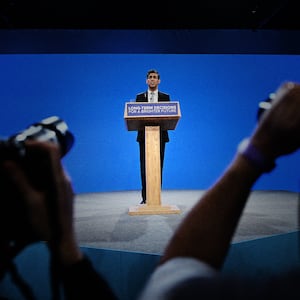British Prime Minister Rishi Sunak took the gamble of his life on Wednesday by calling a general election which will take place on July 4.
The decision to go to the polls months earlier than he was legally obligated to do so comes amid staggering levels of public opposition to both Sunak personally and his Conservative Party, which has been in government since 2010.
The announcement was made on the steps of Downing Street as an unfortunately-timed rainstorm soaked through his expensively-tailored suit jacket.
Sunak tried to speak about his record during the pandemic and the U.K.’s support for Ukraine. But his words were somewhat drowned out by someone loudly playing the song Things Can Only Get Better—the anthem which Tony Blair’s Labour Party used during its crushing 1997 election victory over the Tories.
The optics were appalling for the beleaguered prime minister who walked back into No.10 with his wet jacket clinging to his back and pundits from all sides united in their shock at the amateurish performance.
“These uncertain times call for a clear plan and bold action to chart a course to a secure future,” Sunak said as he became increasingly soaked, apparently having failed to plan to get hold of an umbrella. “You must choose in this election: Who has that plan? Who is prepared to take the bold action necessary to secure a better future for our country and our children?”
His decision to fire the starting pistol on the race may have been informed by recent falls in U.K. inflation which he will doubtlessly use as a campaign platform to claim that his economic policies are working.
The announcement Wednesday came after the British media was set ablaze with speculation that something big was on the way. Downing Street refused to shut down rumors of an impending election—instead referring reporters to Sunak’s favored (and maddeningly vague) line that the vote would take place in the second half of 2024. The anticipation was only heightened when David Cameron, the former prime minister and current foreign secretary, also inexplicably cut short a trip to Albania and the finance minister mysteriously canceled a planned TV interview.
The latest Sunak could have held the election is January 2025. Some pundits theorized that he would hold off from calling the vote for as long as possible given the dire picture that current polling paints for his party’s prospects.
The Tories regularly trail the opposition Labour Party led by Keir Starmer by around 20 points—a chasm in popularity which Sunak now has just weeks to close or risk a disastrous result.
The last time a July general election was held in Britain was in 1945 when Labour won a sweeping majority. Sunak defensively claimed Wednesday that he—and his predecessors—have just overseen the toughest period since the Second World War.
Starmer, unsurprisingly given his current advantage, has been relentlessly calling for Sunak to “get on with” announcing a date for the election. Sunak didn’t miss the opportunity to take shots at his rival when the announcement finally arrived Wednesday.
“On the fifth of July, either Keir Starmer or I will be prime minister,” Sunak said. “He has shown time and time again that he will take the easy way out and do anything to get power.” He also accused Starmer of being “happy to abandon all the promises he made to become Labour leader” and asked: “How can you know that he won’t do exactly the same thing if he were to become prime minister?”
In a video released immediately after Sunak’s announcement, Starmer said: “It’s time for change.” In a telling inversion of his predecessor’s campaign song, Starmer added: “Give the Tories five more years and things will only get worse.”
If the Conservatives are defeated in the election, it would bring an end to 14 years of Tory rule in Britain. Since coming to power in 2010 with Cameron leading a coalition government, another four Tory prime ministers have been in Downing Street.
Each of them has had to manage the party’s notorious infighting which has seen multiple leaders toppled in quick succession—an appetite for regicide apparently so insatiable that the U.K. had no fewer than five Conservative prime ministers over the course of just six years.
As well as catching up to Labour before the election, Suank now also faces the herculean task of pulling his party together to fight what, according to some pollsters, could be a battle for the Tories’ political survival. The question now remains if, on July 4, the British people will finally demand independence of their own—independence from the reign of the Conservatives.





